- Home
- Jean M. Auel
The Valley of Horses Page 18
The Valley of Horses Read online
Page 18
Jondalar’s relief was so evident when he saw Jetamio come out of the tent with the backframes that she was a little ashamed she hadn’t gotten them sooner. She knew his problem, but he was so funny. He thanked her profusely with unfamiliar words that nonetheless communicated his gratitude, and then he headed for the patch of high brush. He felt so much better with dry clothes on, he even forgave Jetamio for laughing.
I suppose I did look rather ridiculous, he thought, but those trousers were wet, and cold. Well, a little laughter is a small price to pay for their help. I don’t know what I would have done … I wonder how they knew? Perhaps the healer has other powers—that could explain it. Right now, I’m just glad for the healing powers. He stopped. At least I think that zelandoni has healing powers. I haven’t seen Thonolan. I don’t know if he’s better or not, I think it’s time I found out. After all, he is my brother. They can’t keep me away if I want to see him.
Jondalar strode back to the camp, put his pack down beside the fire, deliberately took the time to stretch out his damp clothes to dry again, and then headed for the tent.
He nearly bumped into the healer, who was leaving just as he ducked to enter. The Shamud sized him up quickly, and before Jondalar could attempt to say anything, smiled ingratiatingly, stepped aside, and waved him on with an exaggerated graceful gesture, acquiescing to the tall, powerful man.
Jondalar gave the healer an appraising look. No hint of relinquished authority showed in the piercing eyes evaluating him in return, though any further disclosure of intent was as obscure as the ambiguous color. The smile, which had seemed ingratiating at first glance, was more ironic on second look. Jondalar sensed that this healer, like many of that calling, could be a powerful friend or a formidable enemy.
He nodded, as though reserving judgment, briefly smiled his thanks, and went in. He was surprised to see that Jetamio had arrived before he did. She was supporting Thonolan’s head, holding a bone cup to his lips.
“I might have known,” he said, and his smile was pure joy at seeing his brother awake, and apparently much improved. “You did it again.”
Both of them looked up at Jondalar. “What did I do, Big Brother?”
“Within three heartbeats of opening your eyes, you managed to get the prettiest woman around waiting on you.”
Thonolan’s grin was the most welcome sight his brother could imagine. “You are right about the prettiest woman around.” Thonolan looked fondly at Jetamio. “But what are you doing in the spirit world? And while I’m thinking of it, just remember, she’s my own personal donii. You can keep your big blue eyes to yourself.”
“Don’t worry about me, Little Brother. Every time she looks at me, all she can do is laugh.”
“She can laugh at me anytime she wants,” Thonolan said, smiling at the woman. She smiled in return. “Can you imagine waking up from the dead to that smile?” His fondness was beginning to look adoring as he stared into her eyes.
Jondalar looked from his brother to Jetamio and back again. What is going on here? Thonolan just woke up, they can’t have said one word to each other, but I’d swear he was in love. He looked at the woman again, more objectively.
Her hair was a rather nondescript shade of light brown, and she was smaller and thinner than the women Thonolan was usually attracted to. She could almost be mistaken for a girl. She had a heart shaped face with regular features and was really a rather ordinary-looking young woman; pretty enough, but certainly not exceptional—until she smiled.
Then, by some unexpected alchemy, some mysterious redistribution of light and shadows, some subtle shift in arrangement, she became beautiful, completely beautiful. So complete was the transformation that Jondalar had thought of her as beautiful himself. She had only to smile once to create that impression, yet he had the feeling she didn’t usually smile often. He remembered she had seemed solemn and shy at first, though it was hard to believe now. She was radiant, vibrantly alive, and Thonolan was looking at her with an idiotic, lovesick grin.
Well, Thonolan has been in love before, Jondalar thought. I just hope she won’t take it too hard when we leave.
One of the laces that held closed the smoke-hole flap in the roof of his tent was frayed. Jondalar was staring at it, but not seeing it. He was wide awake, lying in his sleeping roll wondering what had brought him out of the depths of sleep so quickly. He didn’t move, but he was listening, smelling, trying to detect anything unusual that might have alerted him to some impending danger. After a few moments, he slipped out of his bedroll and looked carefully out of the opening of his tent but could find nothing wrong.
A few people were gathered around the campfire. He wandered over, still feeling restless and edgy. Something bothered him, but he didn’t know what. Thonolan? No, between the skill of the Shamud and Jetamio’s attentive care, his brother was doing well. No, it wasn’t Thonolan that was troubling him—exactly.
“Hola,” he said to Jetamio as she looked up and smiled.
She didn’t find him so laughable any more. Their mutual concern for Thonolan had begun to ripen into friendship, though communication was limited to basic gestures and the few words he had learned.
She gave him a cup of hot liquid. He thanked her with the words he had learned that expressed the concept of thanks for them, wishing he could find a way to repay them for their help. He took a sip, frowned, and took another. It was an herb tea, not unpleasant, but surprising. They customarily drank a meat-flavored broth in the morning. His nose told him the kerfed wooden cooking box near the fire had roots and grain simmering in it, but no meat. It took only a quick glance to explain the change in the morning menu. There was no meat; no one had gone hunting.
He quaffed his drink, put down the bone cup, and hurried back to his tent. While waiting, he had finished making the sturdy spears out of the alder saplings and even tipped them with flint points. He picked up the two heavy shafts that were leaning against the back of the tent, then reached inside for his backframe, took several of the lighter throwing spears, and walked back to the fire. He didn’t know many words, but it didn’t take many to communicate a desire to go hunting, and before the sun was much higher, an excited group was gathering.
Jetamio was torn. She wanted to stay with the wounded stranger whose laughing eyes made her feel like smiling every time he looked at her, but she wanted to go hunting, too. She never missed a hunt if she could help it, not since she had been able to hunt. Roshario urged her to go. “He’ll be fine. The Shamud can take care of him without you for a little while, and I’ll be here.”
The hunting party had already started out when Jetamio called after them and ran up out of breath, still tying on her hood. Jondalar had wondered if she hunted. Young Zelandonii women often did. For women, it was a matter of choice, and the custom of the Cave. Once they started having children, women usually stayed closer to home, except during a drive. When they went on battue, every able-bodied person was necessary to drive a herd into traps or over cliffs.
Jondalar liked women who hunted—most men of his Cave did, though he’d learned the feeling was by no means universal. It was said that women who had hunted themselves appreciated the difficulties and made more understanding mates. His mother had been noted, especially, for her tracking prowess, and she had often joined a hunt even after she had children.
They waited for Jetamio to catch up, then set off at a good pace. Jondalar thought the temperature was dropping, but they were moving so fast that he wasn’t sure until they stopped beside a meandering streamlet winding its way across the flat grassland searching for a way to reach the Mother. He noticed the ice thickening along the edges when he filled up his waterbag. He pushed back his hood, the fur around his face limiting peripheral vision—but before long he wasn’t alone in pulling it back on. The air was decidedly nippy.
Someone noticed tracks upstream, and they all gathered around while Jondalar examined them. A family of rhinoceroses had stopped for a drink, too, and not long before. Jondalar
drew a plan of attack in the wet sand of the bank with a stick, noticing the ice crystals were hardening the ground. Dolando asked a question with a stick of his own, and Jondalar elaborated on the drawing. Understanding was reached and they were all eager to get moving again.
They broke into a jog, following the tracks. The fast pace warmed them, and hoods were loosened again. Jondalar’s long blond hair crackled and clung to the fur of his hood. It took longer than he expected to catch up, but when he sighted the reddish brown woolly rhinos ahead, he understood. The animals were moving faster than usual—and straight north.
Jondalar glanced uneasily at the sky; it was a deep azure bowl inverted over them, with only a few scattered clouds in the distance. It didn’t appear that a storm was brewing, but he was ready to turn back, get Thonolan, and get out. No one else seemed to have any inclination to leave, now that the rhinos were in sight. He wondered if their lore included the forecasting of snow by the northward movement of the woollies, but he doubted it.
It had been his idea to go hunting, and he’d had little difficulty communicating that; now he wanted to get back to Thonolan and get him to safety. But how was he going to explain that a snowstorm was on the way when there was hardly a cloud in the sky, and he couldn’t speak the language? He shook his head; they’d have to kill a rhino first.
When they drew nearer, Jondalar dashed ahead, trying to outdistance the last straggler—a young rhino, not full grown and having a little trouble keeping up. When the tall man pulled ahead, he shouted and waved his arms, trying to get the animal’s attention to make him veer or slow down. But the youngster, pushing forward toward the north with the same single-minded determination as the others, ignored the man. They were going to have trouble distracting any of them, it seemed, and it worried him. The storm was coming faster than he thought.
Out of the corner of his eye, he noticed that Jetamio had caught up with him, and he was surprised. Her limp was more noticeable, but she moved with speed. Jondalar nodded his head in unconscious approval. The rest of the hunting party were moving up, trying to surround one animal and stampede the others. But rhinoceroses were not herd animals, sociable and easily led or stampeded, depending upon large numbers for safety—and survival of their kind. Woolly rhinos were independent, cantankerous creatures, who seldom mingled in groups larger than a family, and they were dangerously unpredictable. Hunters were smart to be wary around them.
By tacit agreement, the hunters concentrated on the young one lagging behind, but the shouts of the rapidly closing group neither slowed him down nor hurried him along. Jetamio finally got his attention when she took off her hood and waved it at him. He slowed, turned the side of his head toward the flutter, and seemed decidedly undecided.
It gave the hunters a chance to catch up. They deployed themselves around the beast, those with heavy lances moving in closer, those with light spears forming an outer circle, ready to rush to the defense of the more heavily armed, if necessary. The rhino came to a stop; he seemed unaware that the rest of his troupe were rapidly moving ahead. Then he started out at a rather slow run, veering toward the hood fluttering in the wind. Jondalar moved in closer to Jetamio, and he noticed Dolando doing the same.
Then a young man, whom Jondalar recognized as one who stayed on the boat, waved his hood and rushed in front of them toward the animal. The confused rhino stalled his headlong run toward the young woman and, changing his direction, started after the man. The larger moving target was easier to follow even with limited sight; the presence of so many hunters misled his acute sense of smell. Just as he was getting close, another running figure darted between him and the young man. The woolly rhino stalled again, trying to decide which moving target to follow.
He changed direction and charged after the second who was so tantalizingly close. But then another hunter interceded, flapping a large fur cloak, and, when the young rhino neared it, still another ran past, so close he gave the long reddish fur on his face a yank. The rhinoceros was getting more than confused; he was getting angry, murderously angry. He snorted, pawed the ground, and, when he saw another of those disconcerting running figures, tore after it at top speed.
The young man of the river people was having difficulty staying ahead, and, when he swerved, the rhino swerved in fast pursuit. But the animal was tiring. He had been chasing one after another of the vexatious runners, back and forth, unable to catch up with any. When yet another hood-waving hunter dashed in front of the woolly beast, he stopped, lowered his head until his large front horn touched the ground, and concentrated on the limping figure moving just beyond his reach.
Jondalar raced toward them, his lance held high. He needed to make the kill before the winded rhino caught his breath. Dolando, approaching from another direction, had the same intention, and several others were closing in. Jetamio flapped her hood, warily moving closer, trying to keep the animal’s interest. Jondalar hoped he was as exhausted as he seemed.
Everyone’s attention was riveted on Jetamio and the rhino. Jondalar wasn’t sure what caused him to look north—perhaps a peripheral motion. “Look out!” he cried, spurting forward. “From the north, a rhino!”
But his actions seemed inexplicable to the others; they didn’t understand his shouts. And they didn’t see the enraged female rhinoceros bearing down on them full tilt.
“Jetamio! Jetamio! North!” he shouted again, waving his arm and pointing his spear.
She looked north, the way he was pointing, and she screamed a warning to the young man the she-rhino was charging. The rest of them raced to help him, forgetting the young one for the moment. It may have been that he was rested, or that the scent of the charging female had revived him, but suddenly the young male rushed the person waving a hood so provocatively close.
Jetamio was lucky he was so close. He didn’t have time to build up speed or momentum, and his snort as he began his advance snapped her attention back, and Jondalar’s as well. She threw herself back, dodging the rhino’s horn, and ran behind him.
The rhinoceros slowed, looking for the target that had slipped away, and wasn’t focusing on the tall man who closed the gap with long strides. And then it was too late. The small eye lost all ability to focus. Jondalar rammed the heavy lance into the vulnerable opening and smashed it into the brain. The next instant, all his sight disappeared when the young woman thrust her spear into the rhino’s other eye. The animal seemed surprised, then stumbled, fell to his knees, and, as life ceased to sustain him, dropped to the ground.
There was a shout. The two hunters looked up and sprinted away at full speed in different directions. The full-grown female rhinoceros was hurtling toward them. But she slowed as she neared the young one, overran a few paces before she halted, then turned back to the young male lying on the ground with a spear bristling out of each eye. She nudged him with her horn, urging him to get up. Then she turned her head from side to side and shifted her weight from foot to foot as though trying to make up her mind.
Some of the hunters tried to get her attention, flapped hoods and cloaks at her, but she didn’t see or chose to ignore them. She nudged the young rhino again, and then, in answer to some deeper instinct, turned north once more.
“I will tell you, Thonolan, it was close. But that female was determined to go north—she didn’t want to stay at all.”
“You think snow is on the way?” Thonolan asked, glancing down at his poultice, then back to his worried brother.
Jondalar nodded. “But I don’t know how to tell Dolando that we’d better leave before the storm comes, when there’s hardly a cloud in the sky … even if I could speak their language.”
“I’ve been smelling snow on the way for days. It must be building up to a big one.”
Jondalar was sure the temperature was still dropping, and knew it the next morning when he had to break a thin film of ice in a cup of tea that had been left near the fire. He tried again to communicate his concern, seemingly without success, and nervously watched the sky
for more overt signs of weather change. He would have been relieved when he saw curdled clouds pouring over the mountains and filling up the blue bowl of the sky, if it weren’t for the imminent threat they posed.
At the first sign that they were breaking camp, he struck his own tent and packed his and Thonolan’s backframes. Dolando smiled and nodded at his readiness, then motioned him toward the river, but there was a nervousness to the man’s smile and deep concern in his eyes. Jondalar’s apprehension grew when he saw the swirling river and the wooden craft bobbing and jerking, straining at the ropes.
The expressions of the men who took his packs and stowed them near the cut-up frozen carcass of the rhino were more impassive, but Jondalar didn’t see much encouragement either. And for all that he was anxious to get away, he was by no means comfortable about the means of transportation. He wondered how they were going to get Thonolan into the boat, and he went back to see if he could help.
Jondalar watched as the camp was dismantled with speed and efficiency, knowing that sometimes the best assistance one could offer was simply to stay out of the way. He had begun to notice certain details in clothing that differentiated those who had set up shelters on land, and referred to themselves as Shamudoi, from the Ramudoi, the men who stayed on the boat. Yet they didn’t quite seem like different tribes.
There was an ease of communication, with much joking, and none of the elaborate courtesies that usually indicated underlying tensions when two different peoples met. They seemed to speak the same language, shared all their meals, and worked well together. He noticed, though, that on land Dolando seemed to be in charge, while the men on the boat looked to another man for direction.
The healer emerged from the tent, followed by two men carrying Thonolan on an ingenious stretcher. Two shafts from the grove of alder trees on the knoll were wound over and around with extra rope from the boat, forming a support between them to which the wounded man was securely lashed. Jondalar hurried toward them, noticing that Roshario had begun taking down the tall circular tent. Her nervous glances toward the sky and the river convinced Jondalar she was not looking forward to the trip any more than he was.

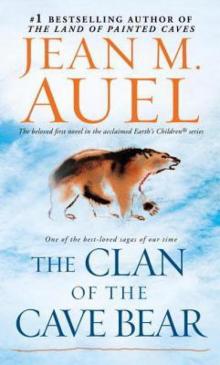 The Clan of the Cave Bear
The Clan of the Cave Bear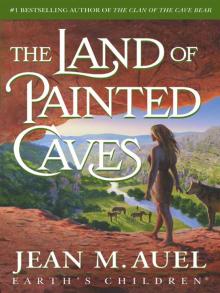 The Land of Painted Caves
The Land of Painted Caves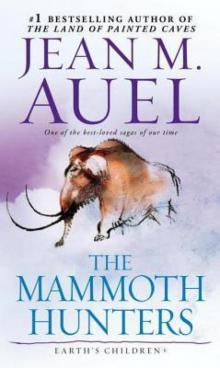 The Mammoth Hunters
The Mammoth Hunters The Earth's Children Series 6-Book Bundle
The Earth's Children Series 6-Book Bundle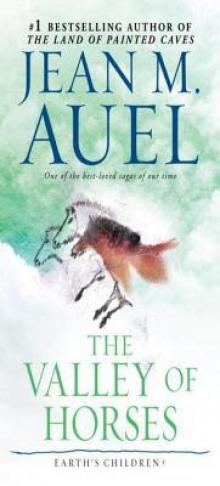 The Valley of Horses
The Valley of Horses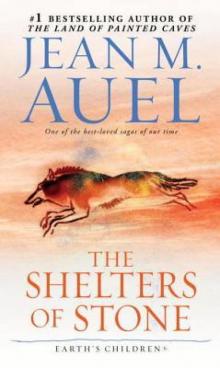 The Shelters of Stone
The Shelters of Stone The Clan of the Cave Bear ec-1
The Clan of the Cave Bear ec-1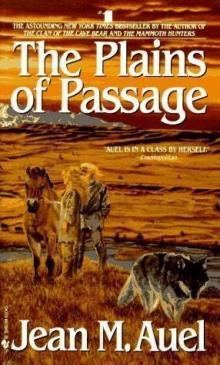 THE PLAINS OF PASSAGE ec-4
THE PLAINS OF PASSAGE ec-4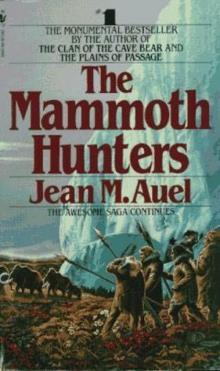 The Mammoth Hunters ec-3
The Mammoth Hunters ec-3 THE SHELTERS OF STONE ec-5
THE SHELTERS OF STONE ec-5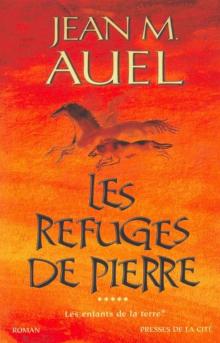 Les refuges de pierre
Les refuges de pierre![Earth's Children [02] The Valley of Horses Read online](http://i1.bookreadfree.com/i1/03/30/earths_children_02_the_valley_of_horses_preview.jpg) Earth's Children [02] The Valley of Horses
Earth's Children [02] The Valley of Horses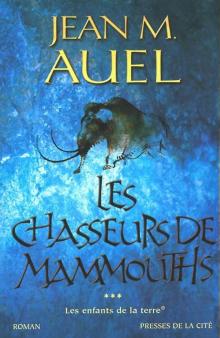 Les chasseurs de mammouths
Les chasseurs de mammouths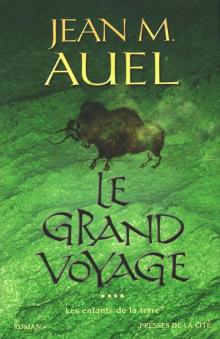 LE GRAND VOYAGE
LE GRAND VOYAGE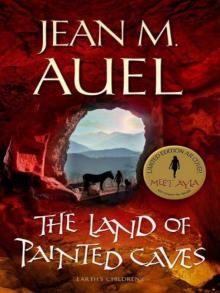 The Land of Painted Caves ec-6
The Land of Painted Caves ec-6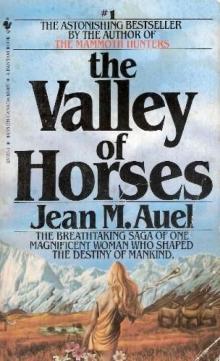 The Valley Of Horses ec-2
The Valley Of Horses ec-2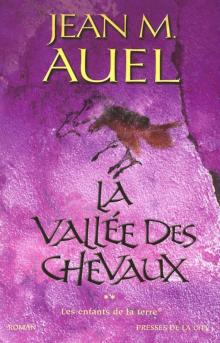 La Vallée des chevaux
La Vallée des chevaux